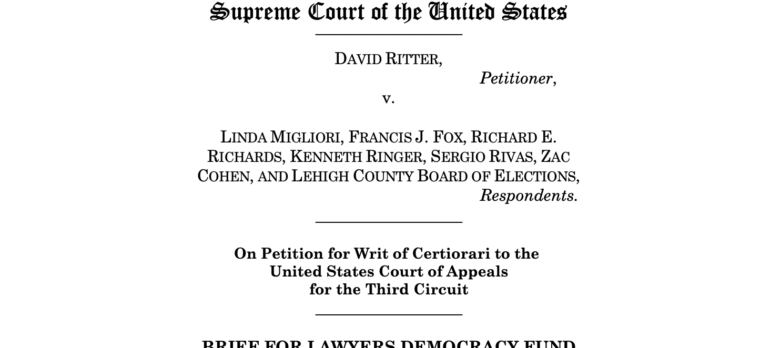
LDF Asks the U.S. Supreme Court to Vacate Abhorrent Third Circuit Decision
Currently pending before the United States Supreme Court is a petition asking the Court to vacate a recent and abhorrent decision from the Third Circuit Court of Appeals in Ritter v. Migliori which held Pennsylvania’s absentee ballot date requirement to be immaterial and unenforceable under the Materiality Provision of the Voting Rights Act.
Since its inception over 50 years ago, the Materiality Provision of the Voting Rights Act has been interpreted to preclude election officials from disqualifying a voter’s registration for immaterial errors, such as minor misspelling errors or for other trivial reasons. Yet, the Third Circuit’s novel decision broke new ground to hold that the Materiality Provision can preempt certain ballot qualification requirements, namely Pennsylvania’s requirement that voters include the date on their absentee ballots.
To defend the compelling interests that states have in enforcing ballot qualification requirements–– such as date, signature, and delivery requirements––LDF filed an amicus brief at the United States Supreme Court in this case, asking the Court to vacate the Third Circuit’s troublesome decision.
LDF warned the U.S. Supreme Court of the impact the Third Circuit’s decision would have if it were left in place:
The decision below has the potential to revolutionize election law by replacing, for a large swath of cases, the established Anderson-Burdick test with an unprecedented and erroneous theory that would invalidate an array of quotidian ballot-casting rules and open a Pandora’s Box of novel challenges to reasonable election administration methods.
The Third Circuit erroneously expanded what it called the “Materiality Provision” of the Civil Rights Act of 1964 beyond its intended application to voter registration. This theory is so capacious and standardless that it would invalidate an array of essential state voting rules, leaving large gaps in state election administration regimes.
This Pandora’s Box, as LDF made clear in its brief, stems from the reality that the Third Circuit’s decision would “prohibit virtually any regulation of how a qualified voter casts a ballot.”
That doctrine, if allowed to stand, would leave states no legitimate room to require that qualified voters vote for one candidate per contest, mark ballots with pens or pencils (not crayons), utilize a standard envelope to mail ballots, or signify on absentee envelopes that a voting ballot is enclosed…
These and other rules are immaterial to determining an individual’s qualifications to register but indispensable to sound election administration. And they are all invalid, according to the Third Circuit.
But even further, LDF’s brief cautions the U.S. Supreme Court of how the Third Circuit’s decision runs contrary to past, infamous elections contests –– namely Bush v. Gore in 2000 and Minnesota’s Senate race between Al Franken and Norm Coleman in 2008 –– in allowing federal courts to have an “expansive role” in setting election policy, where their role should be minimum:
According to the Third Circuit, the Materiality Provision all along mandated federal-court intervention in garden-variety election disputes like those ones and this one…the Third Circuit’s theory would imply that the 2000 presidential recount culminating in Bush v. Gore, was litigated on the wrong foundation…Rather than litigate overvotes and undervotes, and then the state-law process for distinguishing them, any litigant could have invoked the Materiality Provision to invalidate the entire regime.
As the Third Circuit would have it, the entire recount was conducted and litigated under the wrong federal law, notwithstanding the legion of skilled attorneys involved and the acute incentive to locate a federal question.
(internal citations omitted).
Lastly, LDF’s brief highlighted the chaos to Pennsylvania’s, New Jersey’s, and Delaware’s elections the Third Circuit’s decision would create if allowed to stand. None of the mail ballot requirements in these states that safeguard election integrity and the validity of ballots “would appear to survive the Third Circuit’s ruling, yet each serves a compelling state interest” and “[none] of these requirements bears on a voter’s qualifications.”
But more specifically, the Third Circuit’s decision to strike Pennsylvania’s absentee ballot date requirement could upend the entirety of Act 77, Pennsylvania’s no-excuse mail voting system, if allowed to stand due to Act 77’s non-severability clause.
Without this Court’s intervention, the decision below will likely trigger the non-severability provision, which may negate Act 77’s expansion of no-excuse mail-in voting. That outcome is avoidable and should be avoided before the Third Circuit’s erroneous ruling does further damage—not just to Pennsylvania’s election laws but to election laws around the country.
Yet there is still hope. As LDF explained in its brief, the Supreme Court has the power to make things right by granting the petition:
Happily, this Court need do little work to avert election disaster in Pennsylvania, Delaware, and New Jersey in the coming months and years.
In a one-sentence vacatur ruling, it can avoid that result and permit the Third Circuit to take another look at this issue in the future, this time (one hopes) with more thoughtfulness.
To read the LDF amicus brief in its entirety, click here.
Update: On October 11, 2022, the Supreme Court agreed with LDF’s amicus brief, granted certiorari, and vacated the Third Circuit’s ruling with instructions to dismiss as moot under the Munsingwear doctrine in a major victory for election integrity!
To read the Supreme Court’s order, click here.

